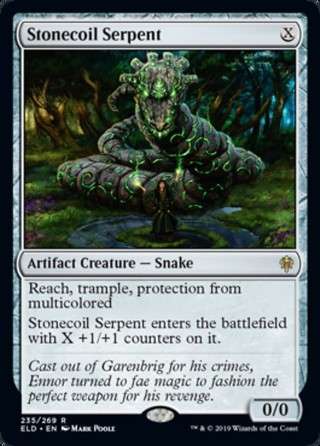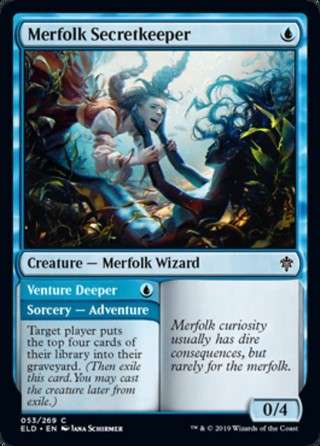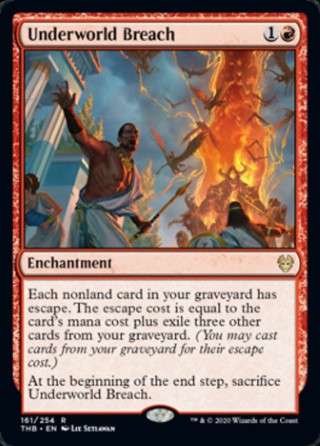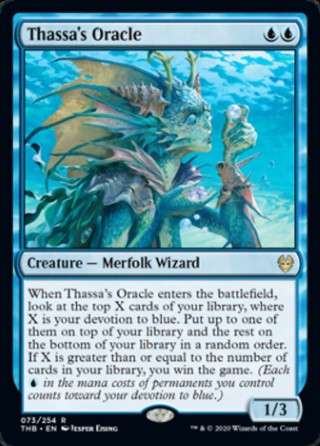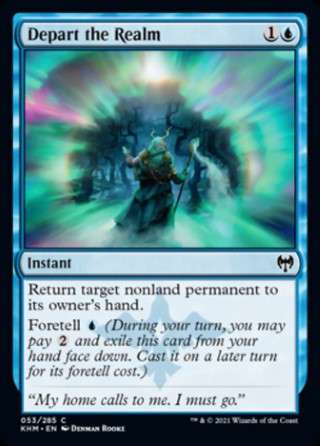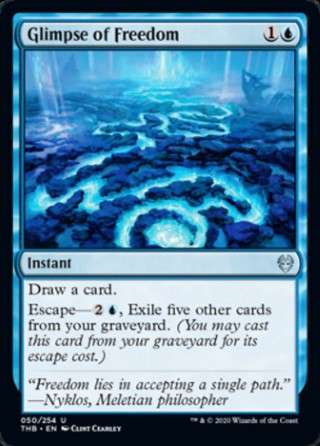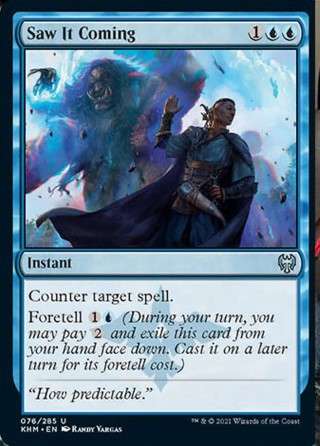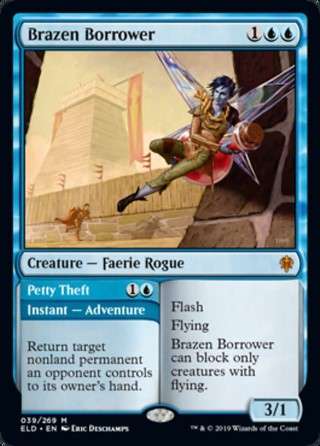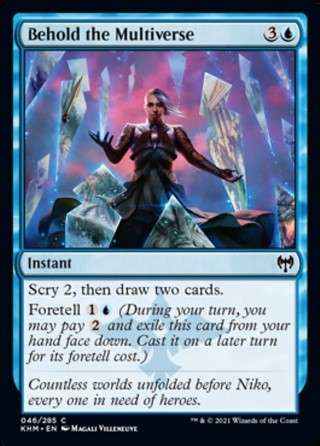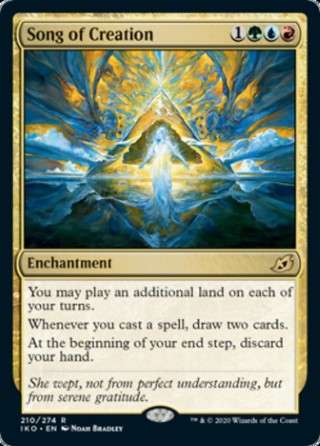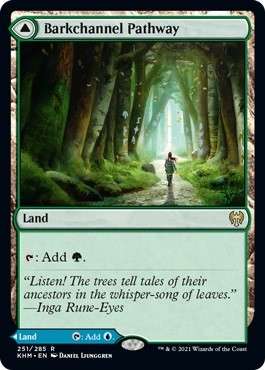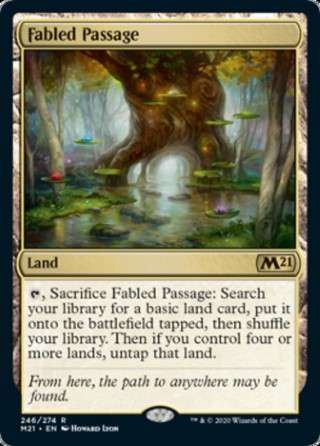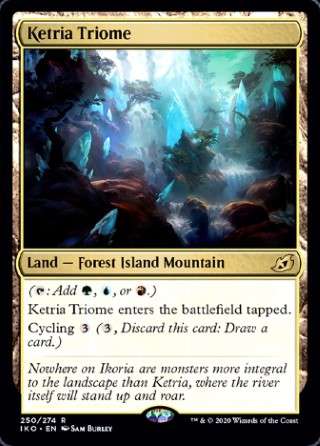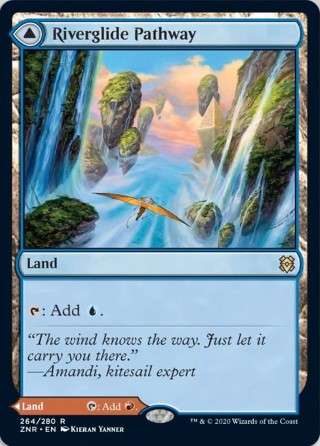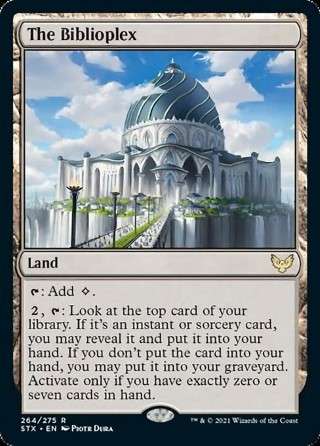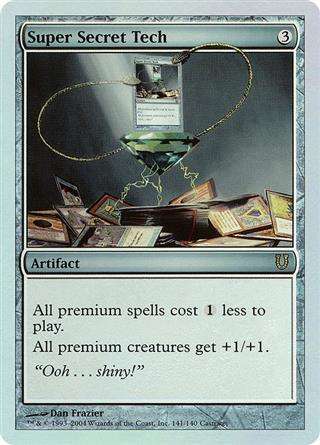Arena Standard - Best Song in Standard
- Deck contains 16 invalid cards for this format: Stonecoil Serpent (ELD), Ketria Triome (IKO), Fabled Passage (M21), Underworld Breach (THB), Thassa's Oracle (THB), Barkchannel Pathway (KHM), Riverglide Pathway (ZNR), Saw It Coming (KHM), Merfolk Secretkeeper (ELD), Unsummon (ANB), Depart the Realm (KHM), Brazen Borrower (ELD), Behold the Multiverse (KHM), Song of Creation (IKO), The Biblioplex (STX), Glimpse of Freedom (THB)
Main 60 cards (19 distinct)
| Creature (14) | |||
|---|---|---|---|
| $0.99€0.700.02 | |||
| $18.40€14.162.09 | |||
| $0.200.03 | |||
| $4.208.86 | |||
| Instant, Sorcery, Enchantment, Artifact (22) | |||
| $11.12€9.340.64 | |||
| $0.28€0.200.03 | |||
|
3
Unsummon
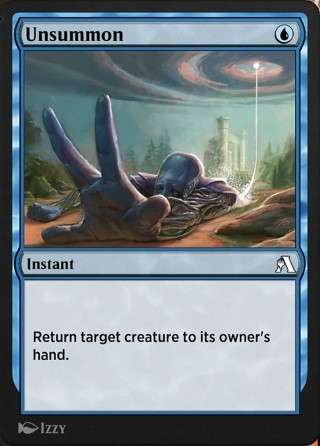
|
|||
| $0.20€0.070.03 | |||
| $0.25€0.180.03 | |||
| $0.72€0.390.22 | |||
| $0.18€0.040.03 | |||
| Land (24) | |||
|
2
Mountain
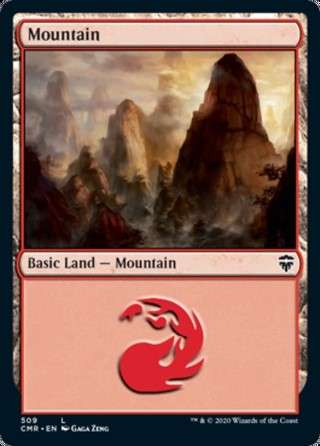
|
$0.150.04 | ||
| $13.99€11.551.02 | |||
|
5
Island
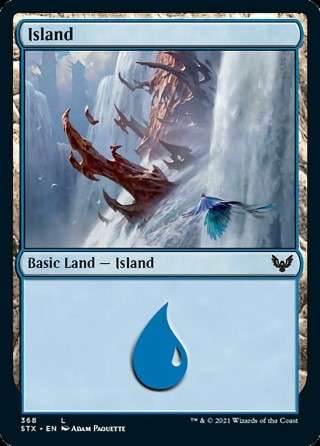
|
$0.150.03 | ||
|
1
Forest
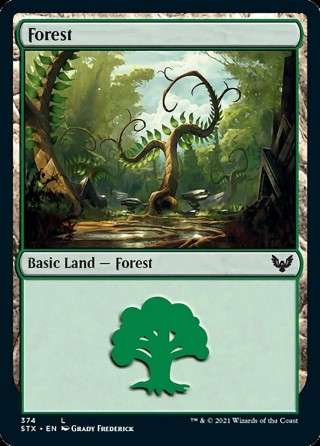
|
$0.150.03 | ||
| $5.62€4.180.15 | |||
| $4.720.14 | |||
| $6.447.09 | |||
| $0.30€0.170.02 | |||
(Simplified, true algorithm in MTGA not revealed by Wizards yet)
COMPARE WITH AETHERHUB COLLECTION
Add at least 100 different cards to your collection and set it as your Compare Collection on the manage page to see what cards from this deck you are missing.
COMPARE WITH MTG ARENA COLLECTION
Compare your MTG Arena Collection with AetherHub decklists or any other decks found on the web with the MTGA Assistant extension. Syncing your account will automatically upload your collection so you can see what cards you are missing right here.
Learn more Download For Windows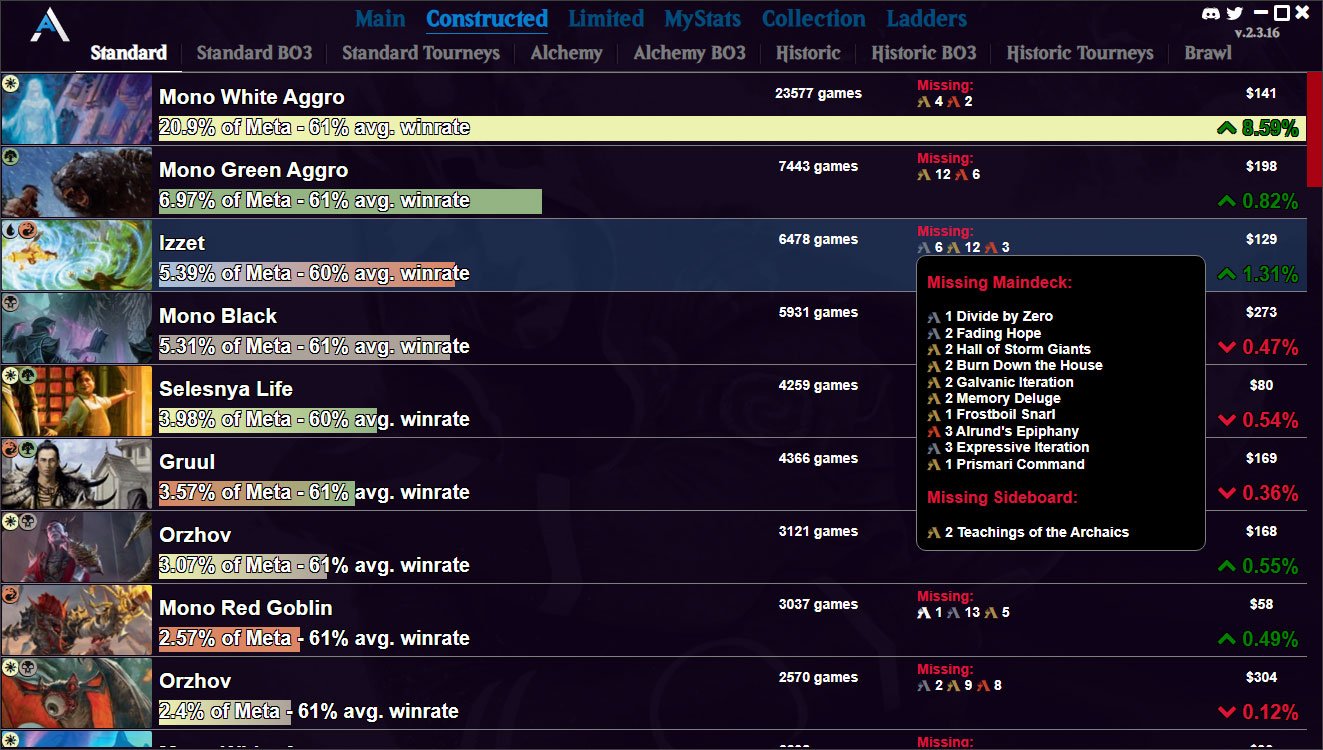
Utilizing some new cards from Kaldheim which are insanely good for this deck we're now able to break Song of Creation in half.
The "cheerios" Song of Creation deck may be more familiar to you, which plays many 0 cost spells to draw 2 free cards off of Song of Creation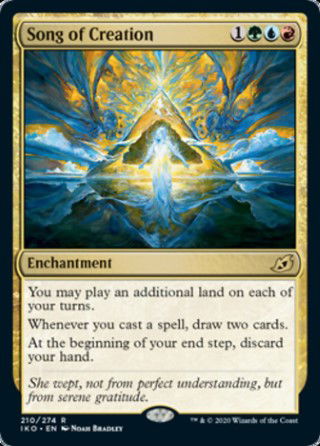 and which attempts to win by decking itself very shortly after playing down the Song of Creation. That version of the deck is very prone to disruption, is dead in the water without a Song, and relies on good 0 mana plays which Standard currently lacks. This deck leans on a very different strategy, and instead of seeking to close the game quickly we use our insane card draw to totally ignore the entire concept of card advantage, giving us the time we need to close out the game in an inevitable, solitaire-style finish that's hard for our opponent to ineract with.
and which attempts to win by decking itself very shortly after playing down the Song of Creation. That version of the deck is very prone to disruption, is dead in the water without a Song, and relies on good 0 mana plays which Standard currently lacks. This deck leans on a very different strategy, and instead of seeking to close the game quickly we use our insane card draw to totally ignore the entire concept of card advantage, giving us the time we need to close out the game in an inevitable, solitaire-style finish that's hard for our opponent to ineract with.
Song of Creation
When you have a Song of Creation down, every spell in your deck draws you 2 cards. You will often be able to play two lands per turn off of its other static ability as well. However, you have the major downside of having to discard your hand. This card would be absolutely broken if it weren't for this downside. So naturally, our goal is to completely circumvent this downside.
By playing cards from zones outside of our hand we give ourselves a get-out-of-jail free card in case we top deck a land. Additionally, we're not supposed to be able to cast spells on our opponent's turn when we have a Song down, but by utilizing instant-speed cards that can be cast from zones outside of our hand, we can consistently untap with 3 cards in hard.
We win by playing one of four Thassa's Oracle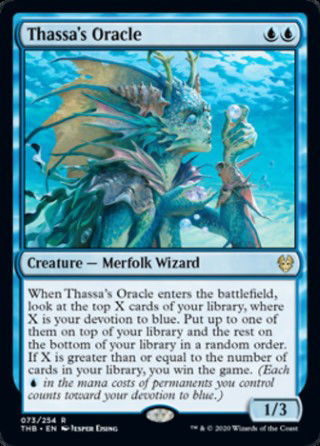 once we've drawn through most of the deck, or one of four Underworld Breach
once we've drawn through most of the deck, or one of four Underworld Breach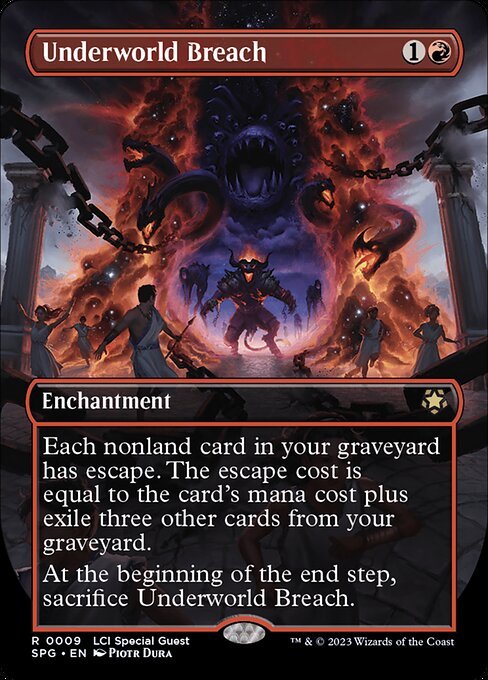 to play an Oracle from the yard, or one of many bounce spells to put her back in hand from the board and replay her. Similar to a control deck, this makes our win condition very hard for our opponent to interact with as the game progresses, making many of our opponent's cards pretty dead, including even their card-draw spells since we largely get to ignore the entire concept of card advantage. It is possible to win by going face, though unlikely except against certain creature-light decks (and even then, the pressure you can put on their face will be more important than actually winning by hitting them in the face).
to play an Oracle from the yard, or one of many bounce spells to put her back in hand from the board and replay her. Similar to a control deck, this makes our win condition very hard for our opponent to interact with as the game progresses, making many of our opponent's cards pretty dead, including even their card-draw spells since we largely get to ignore the entire concept of card advantage. It is possible to win by going face, though unlikely except against certain creature-light decks (and even then, the pressure you can put on their face will be more important than actually winning by hitting them in the face).
Key Spells
Unsummon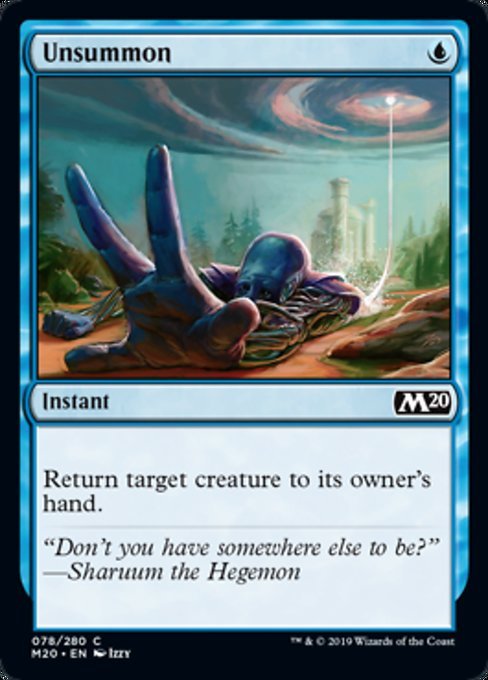 , Depart the Realm
, Depart the Realm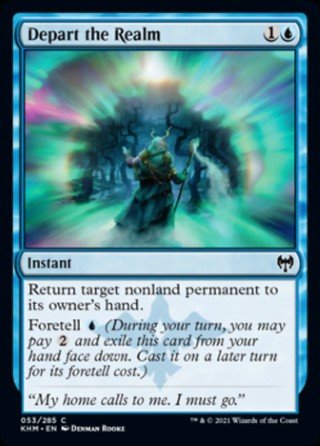 , and Petty Theft
, and Petty Theft are very important control elements of the deck which also have lots of additional utility. Typically, hard/permenant removal is favored over things like bounce. This is often because hard removal can provide you card advantage (or at least card parity). This is why Brazen Borrower
are very important control elements of the deck which also have lots of additional utility. Typically, hard/permenant removal is favored over things like bounce. This is often because hard removal can provide you card advantage (or at least card parity). This is why Brazen Borrower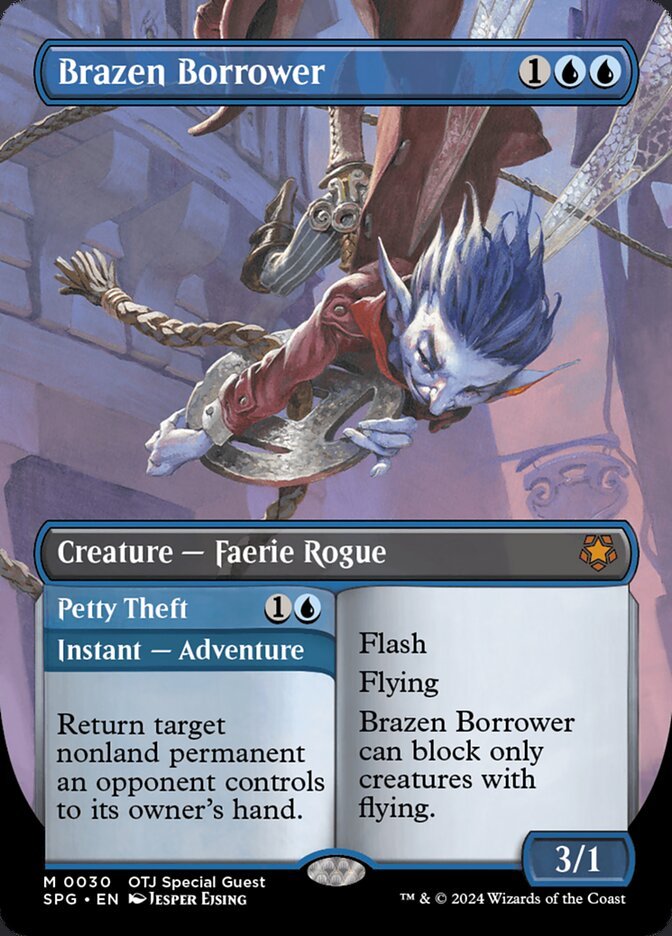 is so ubiquotous in the format: it has the upside of bounce (cheap high-tempo removal), but it doesn't have the downside (you maintain card parity by being able to cast Borrower from the adventure zone after the bounce). However, we don't give a crap about card advantage in this deck thanks to our Song of Creation, and the cheapness of our disruption is more important to us than the card advantage it might provide. It happens frequently that you can consistently bounce or counterspell everything your opponent plays of consequence each turn while you methodically work toward your own win condition in an otherwise solitaire-style game that's hard for your opponent to interact with.
is so ubiquotous in the format: it has the upside of bounce (cheap high-tempo removal), but it doesn't have the downside (you maintain card parity by being able to cast Borrower from the adventure zone after the bounce). However, we don't give a crap about card advantage in this deck thanks to our Song of Creation, and the cheapness of our disruption is more important to us than the card advantage it might provide. It happens frequently that you can consistently bounce or counterspell everything your opponent plays of consequence each turn while you methodically work toward your own win condition in an otherwise solitaire-style game that's hard for your opponent to interact with.
Brazen Borrower , Depart the Realm
, Depart the Realm , Behold the Multiverse
, Behold the Multiverse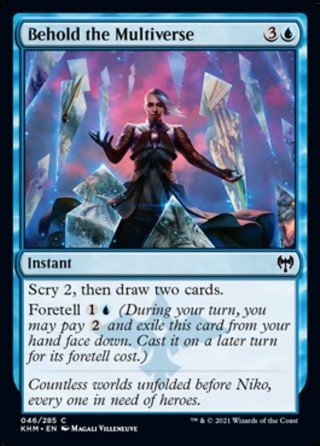 , and Saw It Coming
, and Saw It Coming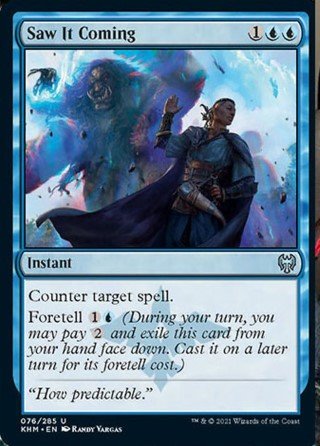 are uniquely impactful because you can cast them on your opponent's turn from zones outside of your hand, allowing you to protect the Song of Creation and also to untap with 3 cards in hand instead of with just 1, which is a very big deal for a Song deck as it essentially nullifies the only downside of the card.
are uniquely impactful because you can cast them on your opponent's turn from zones outside of your hand, allowing you to protect the Song of Creation and also to untap with 3 cards in hand instead of with just 1, which is a very big deal for a Song deck as it essentially nullifies the only downside of the card.
Glimpse of Freedom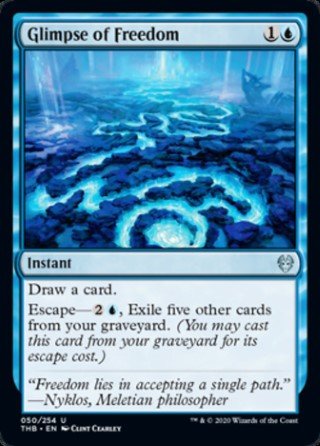 gives us a very cheap draw 3 we can always cast from our yard, and at instant speed, to bail us out situations where we've stalled out, or really need to dig for an answer in that moment. It's not a terrible topdeck either - at only 2 mana it's cheap enough to cast from hand to draw 3 cards with the Song trigger in order to get deeper. It does cost 1 more mana than we'd really like for this effect on top-decks, but because it's colorless it doesn't really matter - we often have non-blue mana that we would otherwise have no use for, so paying an additional 1 or 2 colorless for this effect is no big deal when this card can be so useful for us in the graveyard.
gives us a very cheap draw 3 we can always cast from our yard, and at instant speed, to bail us out situations where we've stalled out, or really need to dig for an answer in that moment. It's not a terrible topdeck either - at only 2 mana it's cheap enough to cast from hand to draw 3 cards with the Song trigger in order to get deeper. It does cost 1 more mana than we'd really like for this effect on top-decks, but because it's colorless it doesn't really matter - we often have non-blue mana that we would otherwise have no use for, so paying an additional 1 or 2 colorless for this effect is no big deal when this card can be so useful for us in the graveyard.
Behold the Multiverse is particularly important for the deck as it can also be used to dig very effectively for the card you need in that moment, including helping you find your Song of Creation, and it also helps fix opening hands. If you play this deck, absolutely do not underestimate the power of this card in this deck.
is particularly important for the deck as it can also be used to dig very effectively for the card you need in that moment, including helping you find your Song of Creation, and it also helps fix opening hands. If you play this deck, absolutely do not underestimate the power of this card in this deck.
Saw It Coming and Depart the Realm
and Depart the Realm allow us to protect the Song of Creation on our opponent's turn, something which was not really practical in Standard before Kaldheim and is what really pushes this deck over the top.
allow us to protect the Song of Creation on our opponent's turn, something which was not really practical in Standard before Kaldheim and is what really pushes this deck over the top.
Stonecoil Serpent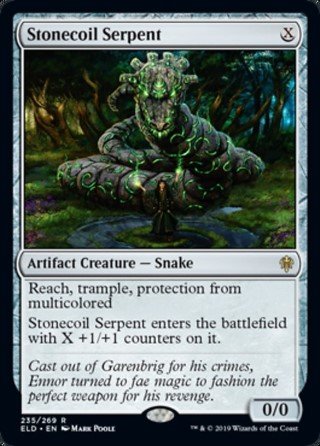 is a 0 mana play to draw free cards off of song, but it is also an important curve-filler to play before you have gone off, or even after you've gone off to answer your opponent's threat or make them take your threats a little more seriously. What our opponent may not know is that we don't actually care about our creatures very much. But if we can force them to care about our creatures, that's just wonderful. Since we are able to ramp very well, our Serpents can easily get pretty big.
is a 0 mana play to draw free cards off of song, but it is also an important curve-filler to play before you have gone off, or even after you've gone off to answer your opponent's threat or make them take your threats a little more seriously. What our opponent may not know is that we don't actually care about our creatures very much. But if we can force them to care about our creatures, that's just wonderful. Since we are able to ramp very well, our Serpents can easily get pretty big.
Micro-Synergies & Micro-Combos
Depart the Realm can be used to bounce Underworld Breach
can be used to bounce Underworld Breach back to your hand at the beginning of your end step before it gets sacrificed in order to be able to replay it and have total access to your graveyard again next turn, but things get complicated when you have a Song of Creation down because of it's discard trigger which will enter the stack at the same time as the Breach's sacrifice trigger. What you can do in that case is order these two simultaneous end step triggers to that the Song's discard resolves first, then you can cast Depart the Realm while the Breach's sacrifice trigger is still on the stack. This will allow you to keep your Breach, it will draw you 2 additional cards (which won't be discard since you've already resolved the Song's discard trigger), and the Depart the Realm will go back in the graveyard so you can pull this trick over and over again, if you like.
back to your hand at the beginning of your end step before it gets sacrificed in order to be able to replay it and have total access to your graveyard again next turn, but things get complicated when you have a Song of Creation down because of it's discard trigger which will enter the stack at the same time as the Breach's sacrifice trigger. What you can do in that case is order these two simultaneous end step triggers to that the Song's discard resolves first, then you can cast Depart the Realm while the Breach's sacrifice trigger is still on the stack. This will allow you to keep your Breach, it will draw you 2 additional cards (which won't be discard since you've already resolved the Song's discard trigger), and the Depart the Realm will go back in the graveyard so you can pull this trick over and over again, if you like.
Underworld Breach can be played with a 0 mana Stonecoil Serpent
can be played with a 0 mana Stonecoil Serpent to convert every 3 cards in our graveyard into 2 cards in hand: it will draw 2 cards when you play it when a Song is down and it will immediately die with 0 toughness, sending it back in the yard where you can cast it again for 0 mana and draw 2 more cards. This is not an infinite combo in this particular deck since it doesn't refill the yard to pay for the Escape cost, but it doesn't need to be infinite to act as a hugely powerful engine to close out games and find good answers.
to convert every 3 cards in our graveyard into 2 cards in hand: it will draw 2 cards when you play it when a Song is down and it will immediately die with 0 toughness, sending it back in the yard where you can cast it again for 0 mana and draw 2 more cards. This is not an infinite combo in this particular deck since it doesn't refill the yard to pay for the Escape cost, but it doesn't need to be infinite to act as a hugely powerful engine to close out games and find good answers.
Merfolk Secretkeeper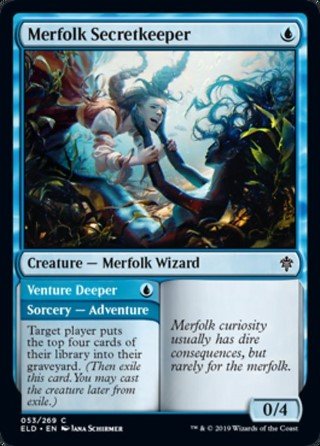 and Stonecoil Serpent
and Stonecoil Serpent are great targets for your bounce: when you play the bounce it will draw you two cards off of the Song trigger AND give you one of these cheap spells to cast as well so that you can get even deeper in your deck.
are great targets for your bounce: when you play the bounce it will draw you two cards off of the Song trigger AND give you one of these cheap spells to cast as well so that you can get even deeper in your deck.
How to Play
This deck is a hard one to play effectively. You need to play a very good game of tempo to survive, so this deck requires that you have a pretty decent knowledge of what cards your opponent is likely to have in their deck. You are also often presented with an overwhelming amount of options and complicated interactions. I selfishly recommend checking out my deck guide attached to this list if you want to get an introduction to effectively using the deck, but here are some general tips:
In general, it's good to play and/or foretell your cards when you can and don't hold them too greedily. You usually want to play your Serpents on curve before you've placed down your Song. Remember that you can bounce your Serpents back to your hand to replay them for 0 or replay them as bigger creatures later.
Remember that your bounce is in the deck mainly for tempo not for permanent removal. Your goal is not to shut your opponent down, it's to slow them down. For example, bouncing a token over a real card is often the wrong play for this deck: even though the token is dealt with more permanently, slowing the opponent down is the key thing and the concept of "card advantage" doesn't really exist for us. You usually don't want to hold your bounce waiting to draw into a Saw It Coming . That's both inefficient and slow and you will rarely want to do that play. Using your bounce for tempo means that you are bouncing their threats which have the fastest impact on closing the game for your opponent, and also bouncing the high-cost permanents that will take more of your opponent's mana to replay. Often, these two things will coincide. Sometimes, it's the better tempo play to bounce your own things and your opponent's "threats" can be ignored.
. That's both inefficient and slow and you will rarely want to do that play. Using your bounce for tempo means that you are bouncing their threats which have the fastest impact on closing the game for your opponent, and also bouncing the high-cost permanents that will take more of your opponent's mana to replay. Often, these two things will coincide. Sometimes, it's the better tempo play to bounce your own things and your opponent's "threats" can be ignored.
Once you play the Song, play cautiously to protect it. If your opponent blows it up, you will likely have only 1 card in hand at the beginning of your next turn and you can very easily stall out from there. Save foretell cards for this eventuality whenever it's practical to do so. For example, it might be better to find and play a bounce spell from your library to deal with a threat than it is to use a foretold Depart the Realm which could otherwise protect your Song during your opponent's turn. In a pinch, saving a Behold the Multiverse
which could otherwise protect your Song during your opponent's turn. In a pinch, saving a Behold the Multiverse to find another Song if yours gets blown up can also serve this function. If your opponent is not currently on the beatdown, it's often fine to pass your turn after top-decking a land instead of playing a foretold spell in an attempt to draw more cards: holding protection for your Song can have a huge impact on the game. Remember that you don't have to be in a rush to finish the game. Inevitably is often on your side thanks to the insane tempo this deck can leverage.
to find another Song if yours gets blown up can also serve this function. If your opponent is not currently on the beatdown, it's often fine to pass your turn after top-decking a land instead of playing a foretold spell in an attempt to draw more cards: holding protection for your Song can have a huge impact on the game. Remember that you don't have to be in a rush to finish the game. Inevitably is often on your side thanks to the insane tempo this deck can leverage.
Use a deck tracker. Since you can draw a ton of cards in a single turn, knowing which particular answers are left in your deck is pretty important. The deck tracker becomes doubly important when you're ready to win and need to draw into a certain card to do so.
Be cautious about playing a second Song of Creation. Most of the time, it's not a good idea as it makes your victory window much more narrow and it's simply not needed. Perhaps you may want to play it early on if you happen to get a second Song, or you may want to play it as insurance against removal, but you're really throwing caution to the wind if you do. If you do play a second Song, keep a Depart the Realm around to bounce it back to your hand in case you need to slow down a bit once you get close to finishing out the game. It's very easy to deck yourself and lose when you have a second Song on the board.
around to bounce it back to your hand in case you need to slow down a bit once you get close to finishing out the game. It's very easy to deck yourself and lose when you have a second Song on the board.
Mana Base
It's important to note that we are NOT playing Cragcrown Pathway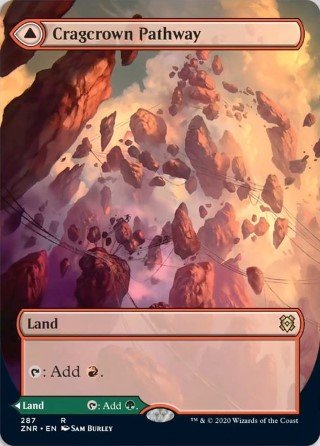 . This is because it is not a blue source, and most of the spells we want to cast are blue. After we get our first red and first green, we generally want all blue. There are only 4 non-blue sources in the deck: two basic Mountains, one basic Forests, and one The Biblioplex
. This is because it is not a blue source, and most of the spells we want to cast are blue. After we get our first red and first green, we generally want all blue. There are only 4 non-blue sources in the deck: two basic Mountains, one basic Forests, and one The Biblioplex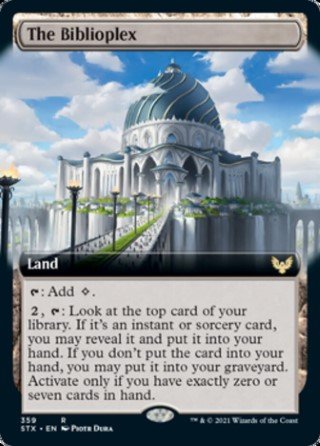 . However, because of the dual-faced modal lands and the basics, you will typically have 4 or more lands that are not blue by the mid game and sometimes you will have no use for those non-blue lands. Foretell does a bit of work for us here, giving us a consistent colorless mana dump.
. However, because of the dual-faced modal lands and the basics, you will typically have 4 or more lands that are not blue by the mid game and sometimes you will have no use for those non-blue lands. Foretell does a bit of work for us here, giving us a consistent colorless mana dump.
24 lands may seem like a lot with an average CMC of 2.2 (and effectively lower thanks to foretelling cards), but getting a 4th land on time is very important and we also don't mind getting lands on top: we can ramp with them thanks to the additional land per turn from the Song and we tend to utilize all of our mana on each of our turns, even after we've ramped a bunch. Ordinarily seeing a land on top in a Song deck can be a huge problem, but our deck has plenty of ways to cast spells from zones outside of our hand so we are not as reliant on top-decks as ordinary, "cheerios"-style Song decks. This deck may even benefit from cutting some spells to play up to 26 lands.
Keep in mind, Thassa's Oracle and Behold the Multiverse
and Behold the Multiverse can- and should be used early to help fix your colors or find a fourth land.
can- and should be used early to help fix your colors or find a fourth land.
This deck has been designed with the hand-smoothing algorithm of Arena's best-of-1 in mind and you may need to make changes to the land base to play this in paper or Arena's best-of-3, including additional fixing and maybe more lands in general to get that 4th land by turn 4.
Notable Exclusions and Maybeboard
Don't play Opt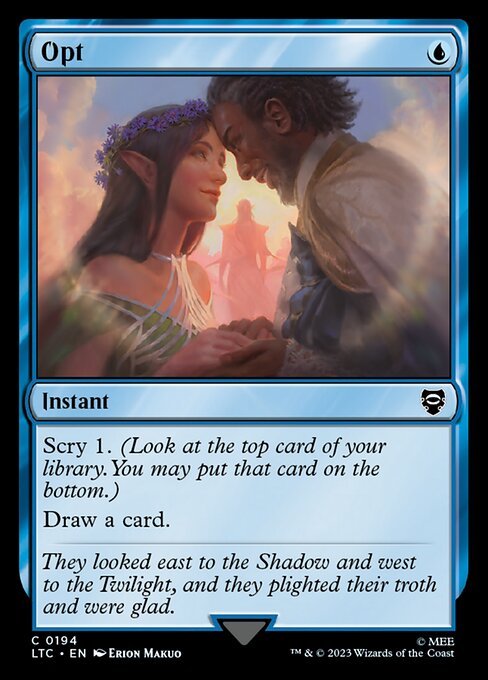 . The only thing of value it does for this deck is help fix your opening hands. Otherwise cards like Unsummon
. The only thing of value it does for this deck is help fix your opening hands. Otherwise cards like Unsummon or Behold the Multiverse
or Behold the Multiverse are about 1,000 times better in this deck.
are about 1,000 times better in this deck.
Crush the Weak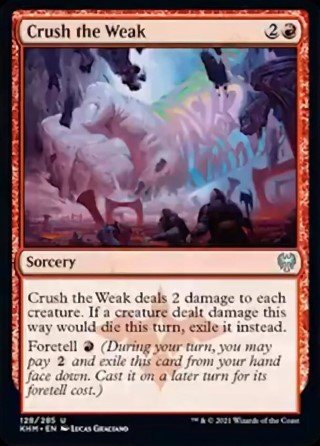 will be happy in the sideboard. Our opponent dumping a lot of creatures to the board is a weakness of this deck, so Crush the Weak is a very good sideboard option and may even find a place in the mainboard for best-of-1 depending on how the meta might change.
will be happy in the sideboard. Our opponent dumping a lot of creatures to the board is a weakness of this deck, so Crush the Weak is a very good sideboard option and may even find a place in the mainboard for best-of-1 depending on how the meta might change.
Ox of Agonas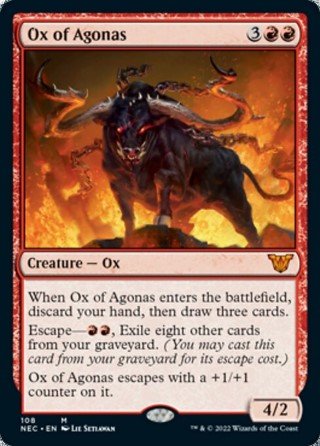 is a potential sub for Glimpse of Freedom
is a potential sub for Glimpse of Freedom (and you'll see that card featured in my deck guide video instead of Glimpse). I went with Glimpse in the end becasue it's a better top deck; it lowers our reliance on blue; and very importantly, we can cast it on our opponent's turn which is huge value.
(and you'll see that card featured in my deck guide video instead of Glimpse). I went with Glimpse in the end becasue it's a better top deck; it lowers our reliance on blue; and very importantly, we can cast it on our opponent's turn which is huge value.
Latest Articles
| 21 | 5 | 30 | 4 | 0 |
|---|---|---|---|---|
| 0 | 0 | 0 | 0 | 0 |
| Symbols | Percentage | Lands |
|---|

